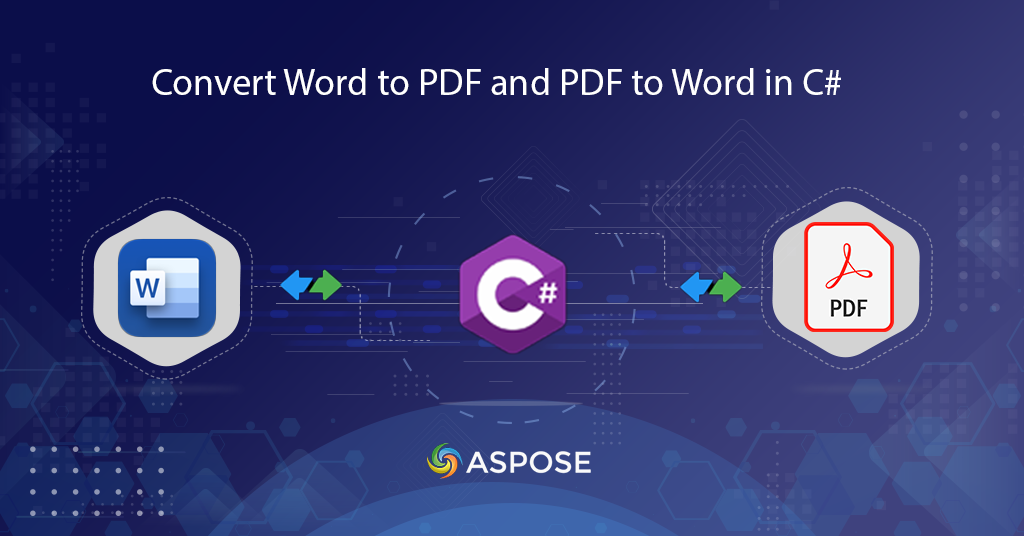
Convert PDF to Word or Word to PDF with .NET REST API
The frequent exchange of information is essential for businesses and individuals alike. The ability to effortlessly convert between Word and PDF formats has emerged as a cornerstone of modern document management. Whether it’s sharing professional documents, ensuring compatibility across various platforms, or preserving the integrity of critical information, the need for seamless Word to PDF and PDF to Word conversion is more pronounced than ever.
This article embarks on a journey into the world of document transformation using .NET REST API. It not just unveils the pressing demand for these conversions but also the multitude of benefits they offer.
Table Of Contents
PDF to Word Conversion REST API
Experience the world of document transformation with the Aspose.Words Cloud SDK for .NET, where Word to PDF and PDF to Word conversion are just the beginning. This dynamic SDK simplifies the conversion process while offering a wide range of document management capabilities. Beyond conversion, you can manipulate document elements, extract data, enhance formatting, and more.
Now before we proceed with document conversion, we need to obtain a Client ID and Client Secret details from cloud dashboard. For more information, please visit obtaining client ID and client secret.
Word to PDF in C#
The conversion of an MS Word file to PDF can be accomplished using a couple of code lines.
Load and save files locally
The following code snippets show the steps to load an MS Word document from a local drive and save it as a PDF.
- Create an object of WordsApi class while passing Client ID and Client Secret as arguments.
- Create an object of ConvertDocumentRequest and provide input file path resultant output format as arguments.
- Call the ConvertDocument(..) method of WordsApi to perform the conversion.
DOC to PDF in Cloud Storage
Given below are the steps describing how to upload an MS Word file from the local system into Cloud storage. Then we perform the conversion operation to PDF format. After a successful conversion, the resultant file is also saved in the same storage.
- Create an object of WordsApi class while passing Client ID and Client Secret as arguments.
- Load MS Word file from the local system and provide it as an argument to UploadFileRequest(..) instance.
- Create an instance of SaveOptionsData where we define the format as well as the name of the resultant file.
- Create an instance of SaveAsRequest class where input Word document (uploaded earlier) and SaveOptionsData information are provided as an argument.
- Call SaveAs(..) method of WordsApi class to initialize the conversion.
PDF to Word in C#
We have a separate API named Apsose.PDF Cloud which provides the features to create and manipulate as well as is also capable of converting PDF files to DOC/DOCX, etc, and other supported formats. However, if you only need to perform PDF to DOC conversion and perform other PDF file manipulation operations, then Aspose.PDF Cloud is a perfect choice. Whereas, if your main work resides with MS Word file manipulation and you also need to perform PDF to DOC conversion, then Aspose.Words Cloud is a perfect choice.
Convert PDF to Word using cURL Commands
As an alternative, explore the realm of document transformation with the seamless conversion of Word to PDF and PDF to Word using Aspose.Words Cloud in conjunction with the simplicity of cURL commands. This dynamic combination not only simplifies the conversion process but also offers a command-line-driven approach, making it accessible to a broader audience of users.
The command below shows how to get the JWT token as per your Client ID and Client Secret.
curl -v "https://api.aspose.cloud/oauth2/token" \
-X POST \
-d "grant_type=client_credentials&client_id=xxxx-xxx-xxx-xxx&client_secret=xxxxxx" \
-H "Content-Type: application/x-www-form-urlencoded" \
-H "Accept: application/json"
The following cURL command can be used to perform PDF to Word conversion over command prompt/console.
curl -X PUT "https://api.aspose.cloud/v4.0/words/destStoredInCloud.pdf/saveAs" \
-H "accept: application/json" \
-H "Authorization: Bearer <JWT Token>" \
-H "Content-Type: application/json" \
-d "{\"SaveFormat\":\"docx\",\"FileName\":\"myResultant.docx\",\"UpdateLastSavedTimeProperty\":true,\"UpdateSdtContent\":true,\"UpdateFields\":true,\"Dml3DEffectsRenderingMode\":\"Basic\",\"UpdateLastPrintedProperty\":true}"
Conclusion
In conclusion, the world of document transformation offers multiple pathways, each tailored to diverse preferences and technical requirements. The first approach, harnessing the capabilities of Aspose.Words Cloud SDK for .NET, provides a comprehensive solution that simplifies the conversion process while extending its capabilities to various Word document related tasks.
On the other hand, the second approach, featuring Cloud SDK and cURL commands, offers an accessible and command-line-driven option, provides a comfortable terminal-based operations. In either case, achieving seamless Word DOC to PDF and PDF to DOC conversion is within reach, offering a valuable solution for document transformation needs.
Useful Resources
Related Articles
It is highly recommended to visit the following links to learn more about: